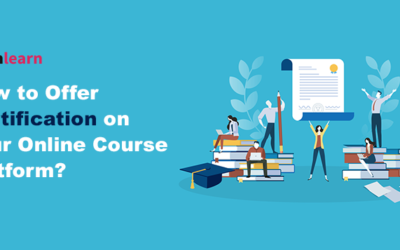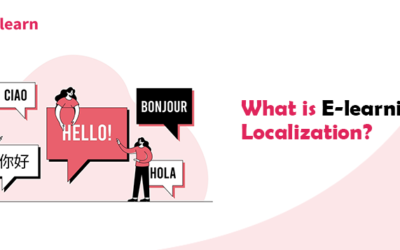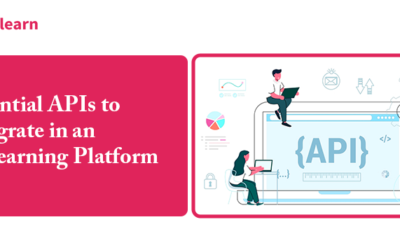How to Start An Online Coaching Business in 2025
In the recent dynamic landscape, coaching has evolved from a defunct industry to an integral part of your success. Health, business, life coaches, they are pretty much everywhere! Thanks to the internet, the prime catalyst of a new-found obsession for self-improvement!
The online coaching industry is expected to reach $11.7 billion by 2032. Accessibility, convenience, AI and data analytics are the major drivers for this exponential growth. Whether you are another aspiring coach who just left their 9-5 job or just flexing out your entrepreneurial muscles, starting an online coaching business is indeed lucrative!
In this blog we’ll walk through all the essential aspects to get started with your coaching business
- Mastering the Coaching Landscape
- Nailing the Business Plan
- Developing Your Coaching Program
- Scaling Your Coaching Business
So, buckle up as we help you set a clear roadmap on how to start an online coaching business!
Why to Start an Online Coaching Business?
While the urge to create a six-figure online coaching business might fascinate you, it is essential to find compelling reasons to get started.
Here are a few reasons to step into this lucrative venture:
1. To rake in profits
If you have the expertise and the right resources, running a coaching business helps you earn a fortune.
2. Explore different revenue streams
As a coach you can earn from 1: 1 or group coaching calls, subscriptions, affiliates, digital downloads (eBooks, courses), podcasts, workshops, speeches, etc.
3. Share your knowledge and expertise
Do you have a unique skill or expertise in a specific domain? Start a coaching business to share your stories, advice and experiences with the world.
4. Invest less, gain more
Your knowledge and platform costs are the only investments you need to begin with coaching. And in return, you can earn substantial profits over time!
5. Coaching industry is growing.
A coach guides their clients through uncertainty and failure and helps them find growth opportunities. Be it career coaching, executive coaching or personal training, coaches are in demand more than ever!
6. Grow professionally and personally
Defining a career in coaching helps you grow as a better individual, personally and professionally.
7. Make a difference
Do you want to help people to achieve their dreams? Coaching is the right career to make a positive difference in an individual’s life.
How to Start an Online Coaching Business: Easy 9-Step Process
Now that you have figured out the whys, let’s delve into the actual process! Whether you wish to get into life coaching, executive coaching, or a less conventional niche, here’s a simple 9-step process to get you going!
Listed below is a clear roadmap on how to build an online coaching business:
1. Identifying Profitable Niches
“If you do the same thing as everyone else and you do it, 10x’s better- You’ll get an incremental advantage. But If you do what no one else is doing, you’ll get a geometric advantage.”
– Tony Robbins, top business coach.
If you aren’t clear on what you can offer people, you can’t establish a solid foundation!
Determining the right niche is “need of the hour” to find your target clientele, create a unique business proposition and a perfect coaching program!
Here’s a quick checklist that helps you brainstorm a few niche ideas:
- Analyze what you have expertise in, including your professional and personal interests
- Come across something you’re deeply passionate about
- Assess if your niche is profitable and if there’s enough demand
- Understand what people are searching about using tools like Google Trends and Google Keyword Planner, Exploding Topics
Now that you have determined your niche, what next? Dig deeper! For instance, you have zeroed in on sports training, brainstorm and choose a sub-niche like fat loss or sports performance. Being specific doesn’t limit your prospects, instead it attracts the right clients.
2. Analyzing Market Demand & Competitors
Now that you have determined your target niche, it’s time to validate your business idea and whom to target. That’s what we call market research! It’s much like testing your foundation: Will it survive, thrive or crumble down?
A good market research helps you to analyze the following areas:
- Does your niche have a sizable demand?
- Do your coaching offerings meet the user’s needs?
- Can your clients afford your coaching program?
- What are the ways to market your coaching business?
So, how do you fine-tune your business with the landscape? Use polls, questionnaires, and surveys, and join potential communities to grasp the evolving market well. Analyze your competitor’s market position, offerings, packages, pricing and marketing strategies and refine your offerings accordingly.
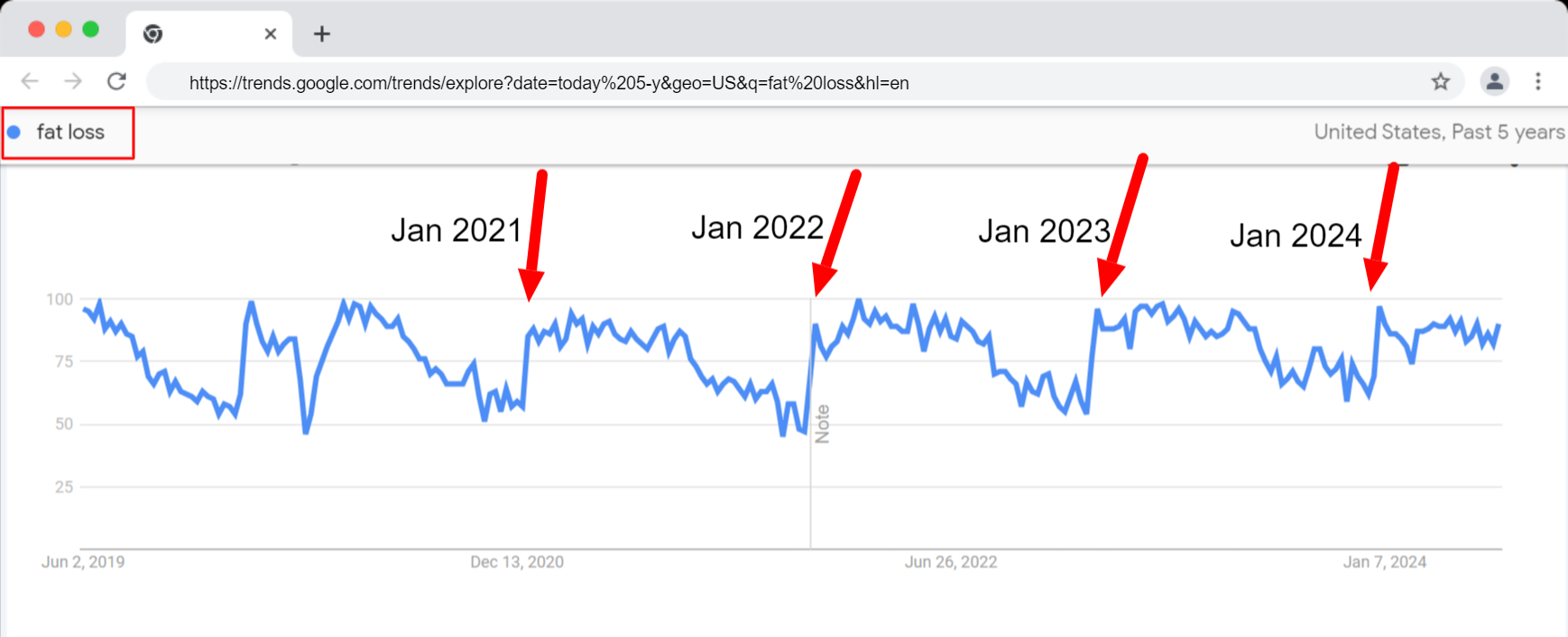
The search volume for the keyword “fat loss” is more in January to June every year. So, coaches can adjust their package prices as per the trend. E.g. Higher package prices in January and lower prices after June.
3. Creating a Solid Business Plan
You might have the vision, belief and drive to build your coaching business.
But have you devised a genius master plan?
While a business plan might sound too technical, here’s the truth: every business needs a business plan or map (as Tony Robbins rightly calls it). It’s like a compass that helps you focus on the right things and guides you in the right direction!
Writing your business plan can be pretty intimidating. Your plan might differ based on your industry, service and product, but here’s a brief outline!
- Executive Summary
Summary of your detailed business plan, including what your business does, goals, unique value proposition, and target clients.
- Company Overview
Briefly describe your company with a mission statement, location, business structure, services, etc.
- Product/ Services
List the products and services and their pricing strategy.
- Value Proposition
Include both the market analysis and value proposition. Your value proposition is your business’s USP, which states why your target audience should buy your product.
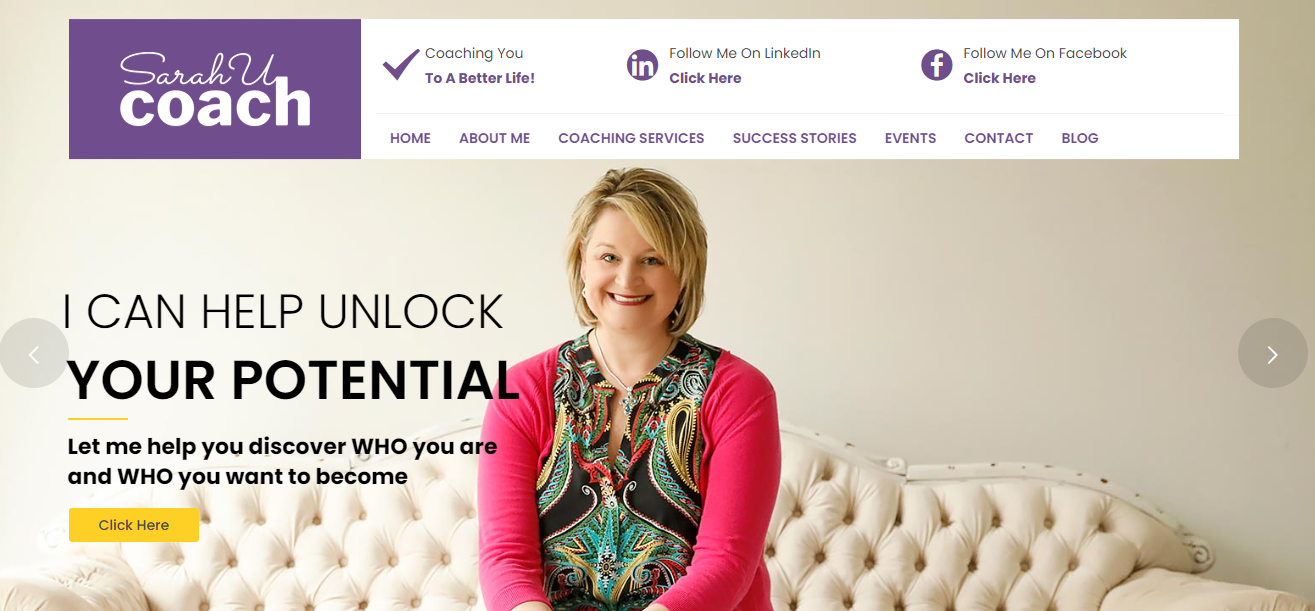
- Business Model
A comprehensive business model explains how your business runs. It includes six essential aspects: operation, marketing, sales strategy, growth plan, management, and financial summary. Popular coaching models are one-to-one, group coaching, membership model, blended approach, and online courses.
PS: Financial summary typically includes the company’s estimates, forecasts, and performance for a specific period.
- Legalities
A coaching contract protects your business from chargebacks and refunds and clearly explains your business to your clients.
4. Building Your Online Coaching Program(Coaching Framework)
“Don’t get caught up in the loop. Create a rough guide on how you want to deliver the program. Improvement is the key to success; change the process a few times until you figure out the perfect formula.”
– Luisa Zhuo, top business coach
Once you have figured out your niche and business plan, it’s time to plan your online coaching program. Imagine your coaching program as an instrument to unlock your client’s true potential!
Remember that your coaching program should channel your unique proposition and meet your client’s needs. Designing a signature coaching program should embody your coaching style yet define a transformative journey for your client!
This might sound overwhelming, so let’s simplify it for you:
- Defining the “what” or outcomes
Your promised result, a.k.a., what your clients will achieve by the end of your program. E.g., “Lose weight within 12 weeks,” “Learn the basics of finance within 60 days”
- Describing the “who” or ideal target client
An effective way to develop your coaching program is to picture your ideal client (one who will benefit from it). Develop a client persona based on their demographics, pain points, aspirations, and psychographics. You can use empathy mapping techniques (what the user says, thinks, does, and feels) to gain valuable insights.
- Decide the “how” or structure and delivery method
Does one-to-one or group coaching work for you? If your coaching program involves offering personalized guidance, then choose one-to-one coaching. Alternatively, if it involves offering the same process for every call, group coaching is a viable option.
- Discern the “when” or timeline
The length of your program depends on the complexity of the solution you offer, your coaching style, the program content! James Clear, author of Atomic Habits, states that forming a new behavior takes more than 2 months. So, ideally, your coaching program needs to be for a minimum period of 8-12 weeks to see the expected results.
- Determine the “which” or outline
Curate your coaching program with the right mix of resources, tools, and activities.
You can structure your program starting with goal-setting, followed by action planning, skill-building, feedback sessions and progress tracking.
Later, you can add bonus sections like reading resources, videos, podcasts, TED talks, etc.
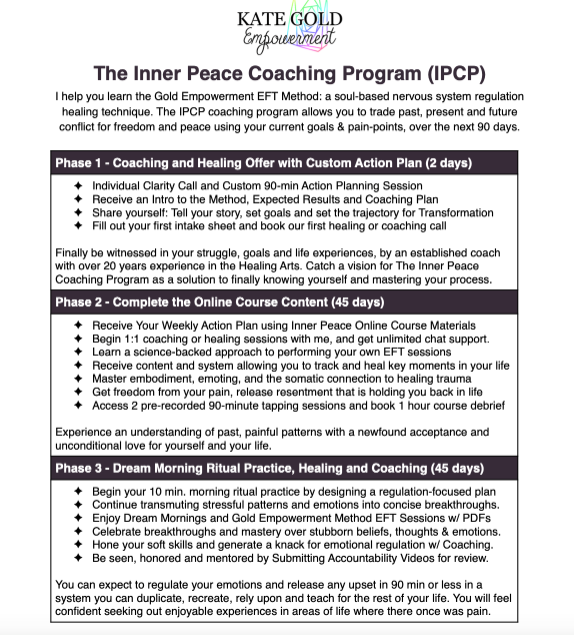
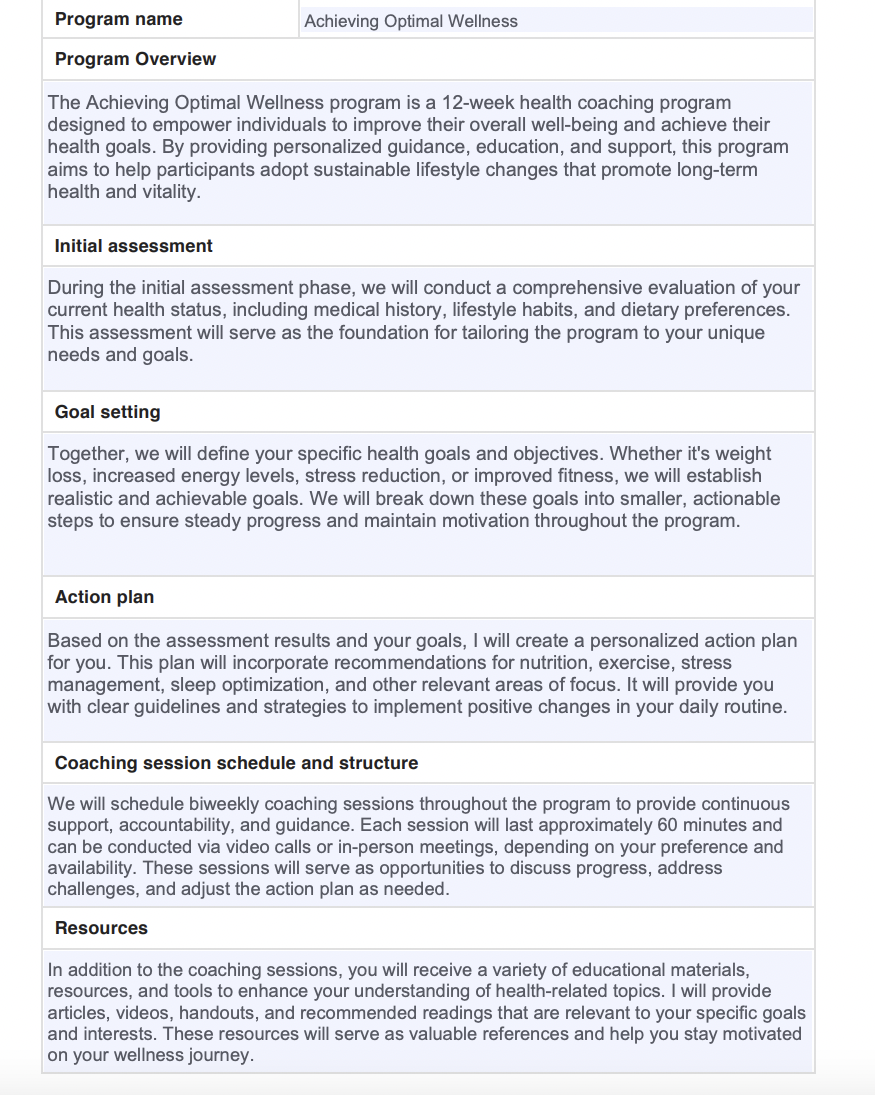
5. Pricing Your Program
“Don’t overthink your pricing. You can experiment with different amounts and adjust as needed.”
– Marc Mawhinny, Founder of Allison Walsh Consulting
As a beginner, you can start by charging an hourly rate, but this limits your pay and the time you invest. So, it’s not recommended as a long-term pricing strategy.
Then, there’s the retainer strategy, where you bring in a more predictable cash flow. Here, the client pays you upfront to reserve your time and expertise for a specific time.
The most recommended approach is to offer packages or programs for a specific period. For example, a 2-month package with 12 calls. Here, you ditch the conventional per-hour model and pitch in the result-driven one!
Another variation of this approach is the performance-based pricing model. Marshall Goldsmith, a top American executive coach, is well known for his unique “pay-only-for-results” model. Goldsmith’s clients pay only if they attain positive, measurable results. However, there’s a catch: the results are determined by their stakeholders.
Here are the crucial factors to determine your ideal pricing point:
- Market trends & competitors
- Time and efforts
- Niche & Target audience
- Value that your coaching offers to clients
Tip: Consider 10-20% higher than your program cost to determine your pricing. Find a sweet spot between what your target audience can afford and a value that justifies your time and efforts!
6. Defining Your Brand
If people like you, they will listen to you, but if they trust you, they’ll do business with you.
- Zig Ziglar, leading personal development coach
What do people love about Apple or McDonald’s the most? Of course, they create phenomenal products, but their branding stands apart! Similarly, branding is significant for coaching! With the sheer number of coaches out there, branding is what makes you heard!
It doesn’t matter whether you’re a rookie or a seasoned coach; you need to relay your unique message. So, what makes a strong brand? Obviously, we visualize the logo, design and font color first. However, it’s also about emotional resonance with the audience.
For instance, Marie Forleo was called the next-generation thought leader by Oprah Winfrey. The multimedia maven has created a staggering empire with her strong brand messaging. Be it her award-winning online show MarieTV or popular online business course, B-school, Forleo’s iconic branding definitely strikes a chord!
Let’s see how Forleo crafts a compelling brand story:
- Brand Messaging
Build a business and life you love!
- Website
Marie Forleo’s Website is predominantly in shades of pink and beige and blends well with her brand message. She has placed all her offerings and achievements well to convey what her brand stands for!
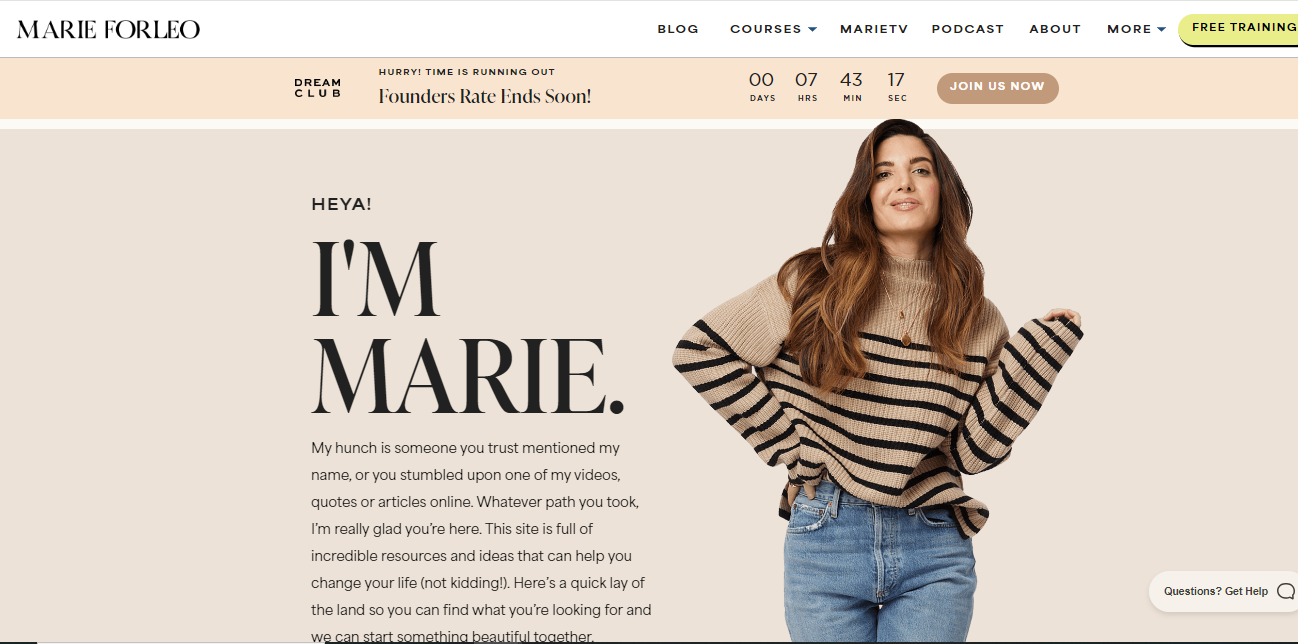
- Social Media
Mario Forleo’s Instagram profile stays true to her brand message, with occasional displays of her brand color in the posts.
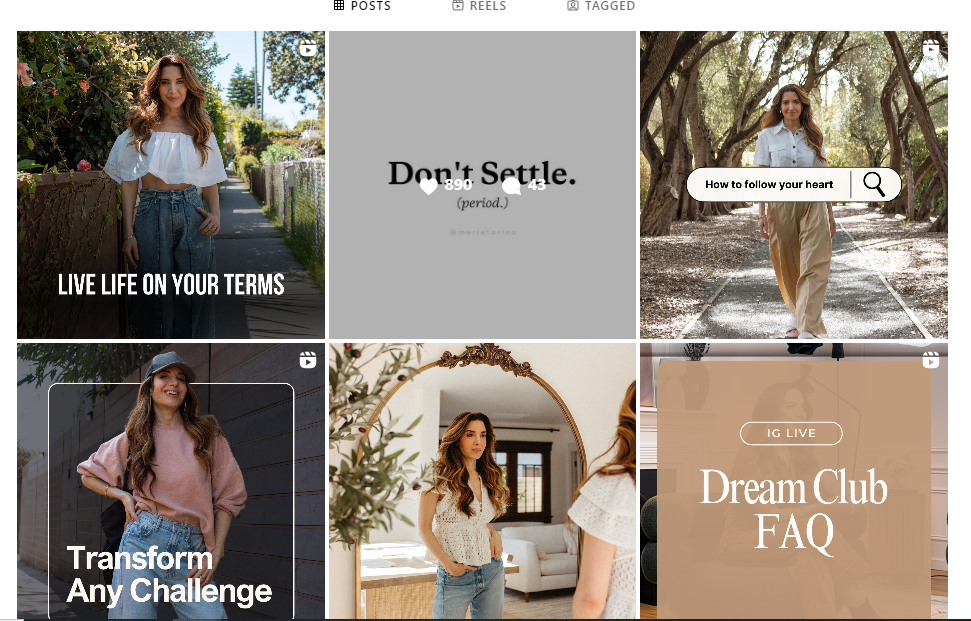
- Reviews:
The official website also has a dedicated page with client success stories, which creates an attractive portfolio for website visitors.
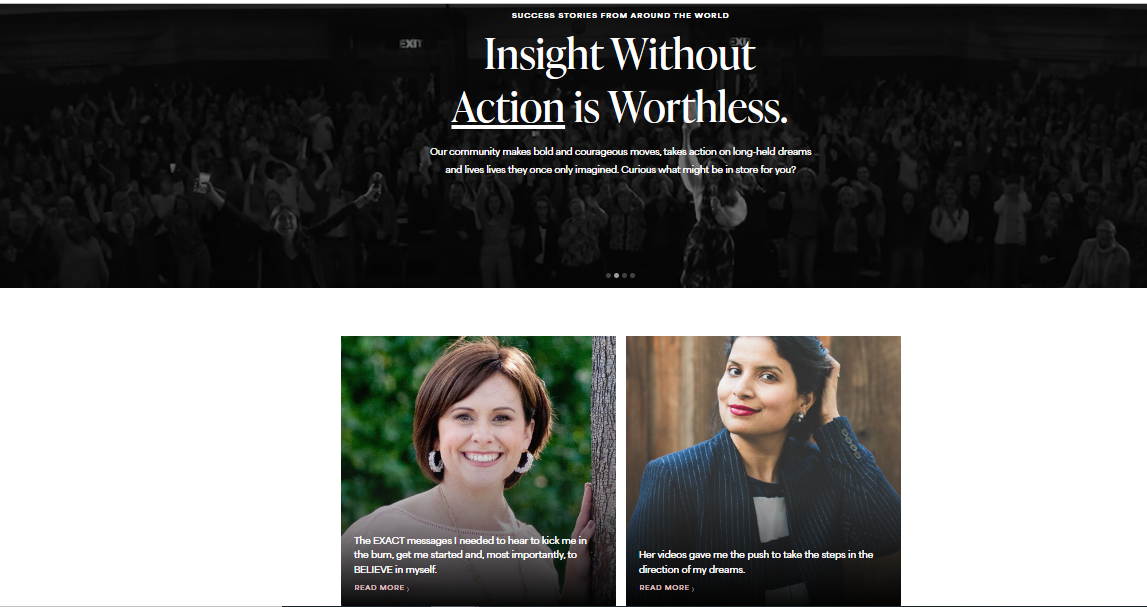
Customer Support:
Additionally, the website has a dedicated customer support page that offers a FAQ section and contact form to raise your queries with the support team.
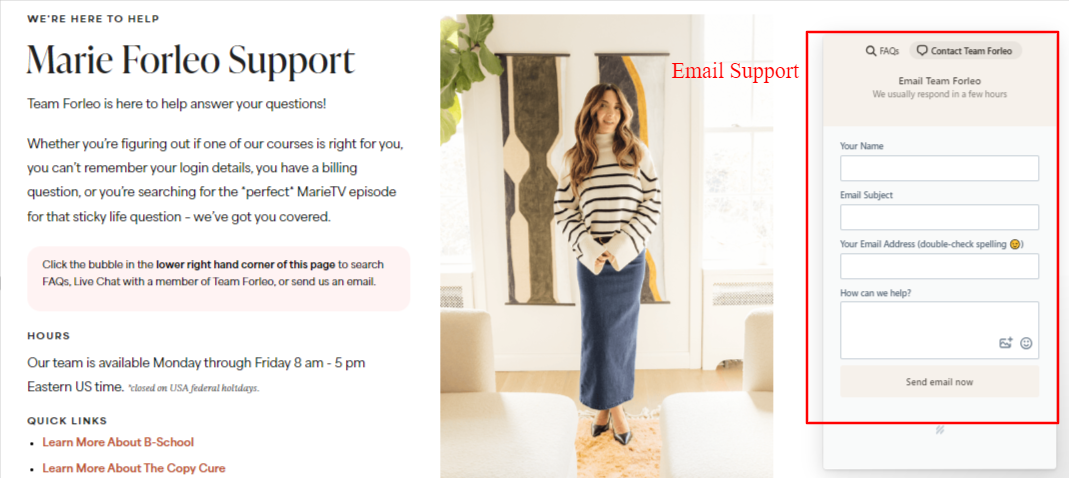
7. Setting up Your Coaching Platform/ Services
Well, now you have nailed the branding like a pro! It’s time to choose a medium to deliver your expertise. Delivering a coaching program is not just about pep talks through luminescent Zoom screens. You need to offer an excellent user experience, right?
Here are the core features that make a robust coaching platform:
- Content Delivery
Video conferencing and whiteboard tools for hosting live sessions, webinars, recording sessions, course creation and management, and online learning platforms.
- Website Creation
Professional-looking website templates, customization for branding and logo, and multi-language support.
- Multiple Revenue Streams
Live coaching sessions, courses, subscriptions, referrals.
- Secure Communication
Chat messaging, event notifications, newsletters, forums, message boards, social management tools.
- Management & Tracking
Coaching analytics dashboard for tracking earnings, one-to-one and group bookings, payout requests, and coupon or discount management.
- Robust Payment Infrastructure
Integrate with trusted payment gateways like Stripe and PayPal
- Organization
Built-in calendar to manage your schedule and availability tracking.
- Marketing
Integration with MailChimp for email marketing, Google Analytics for web analytics and Send Grid for email notifications.
Pinlearn – A comprehensive solution for Coaching Business
Pinlearn is a ready-made script that offers all the essential aspects for coaching — a live coaching, course management feature, analytics, payment gateways, and marketing mechanisms. The platform comes with a 100% customizable source code to build your dream coaching marketplace! Most importantly, there are no hidden costs, just the one-time fee to purchase the product.
8. Client Acquisition and Retention
“Fall in love with your ideal clients and not products.”
- Tony Robbins, top business coach
Now that you have launched your coaching platform, you must get into the actual game! Yes, setting your coaching services just sets the stage; the final act is yet to unfold! Of course, you need clients to get into business! And what better than a sales pipeline that leads your potential customers to actual customers?
But how to get clients for your coaching business?
Here are the the effective ways to grow your clientele:
- Social Media Platforms
Facebook, LinkedIn, TiTok, and Instagram are common platforms on which clients are active. Use relevant hashtags to attract the right audience!
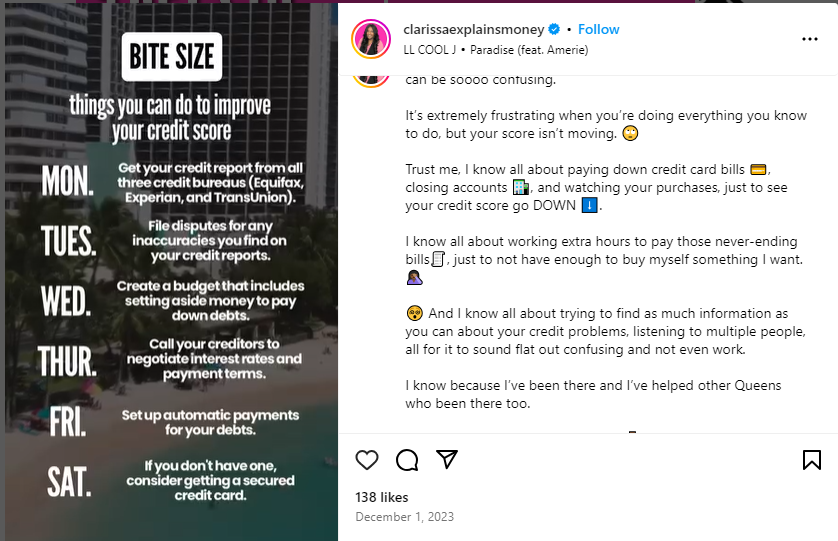
Clarissa Moore, a popular money coach, offers solutions, advice and financial tips on her social handle and attracts the right kind of client.
- Compelling Lead magnets
eBooks, quizzes, and free webinars make effective lead magnets through the sales funnel
- YouTube channel
Start your YouTube channel by offering valuable insights or tips and addressing your clients’ problems.
- Sales page
Well-crafted landing pages with compelling headlines, descriptions, and effective CTAs drive more conversions.
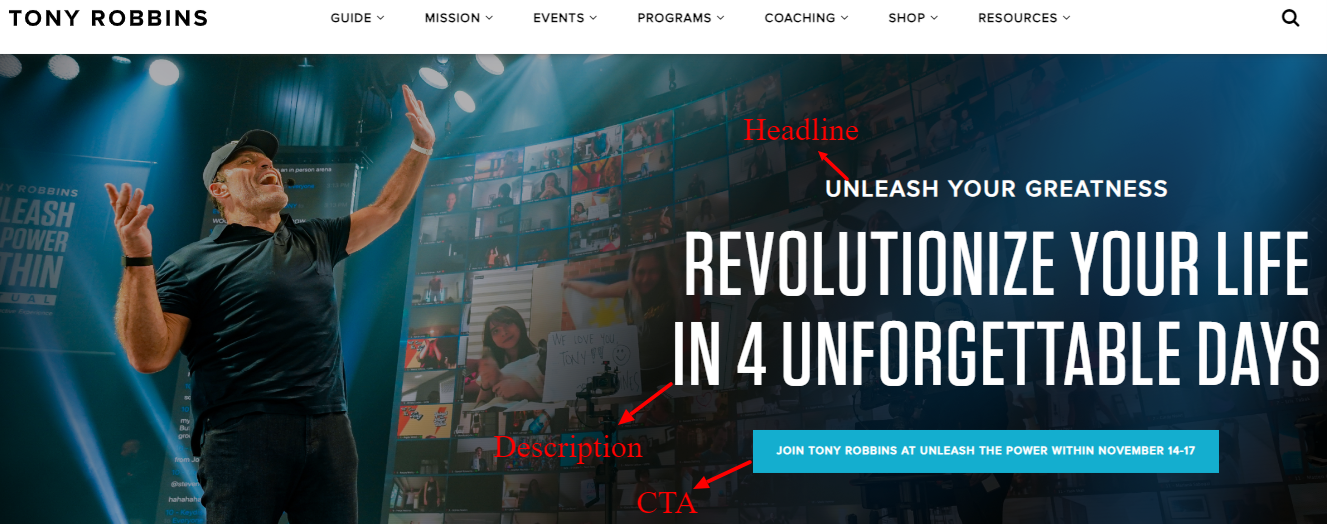
- Email marketing
Build trust and credibility by sharing valuable information and engaging your audience.
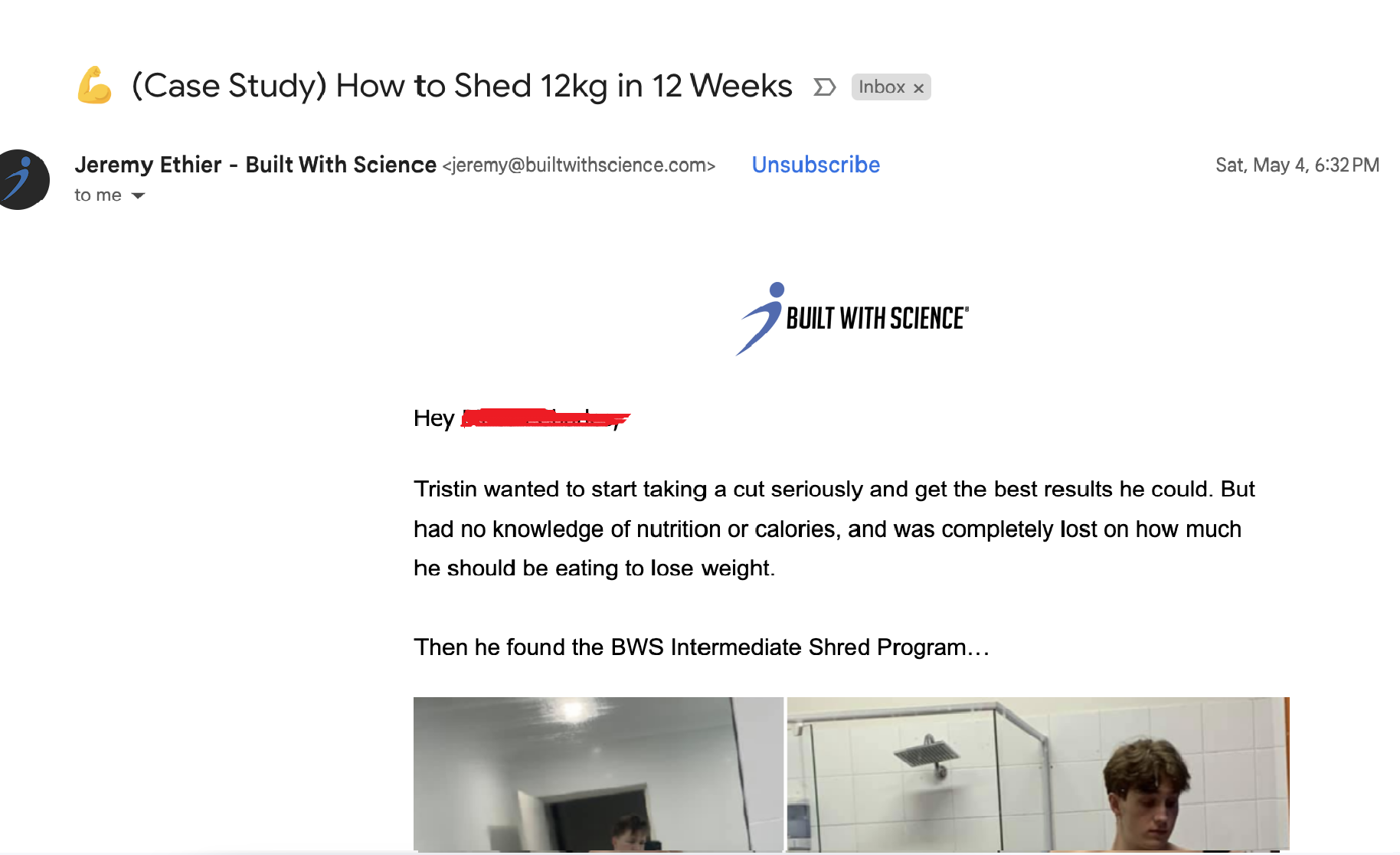
- Influencer marketing
Research and choose influencers from your niche and collaborate with them to promote your courses.
Luisa Zhou, leading business coach, lists 5-best-places for growing your clientele that span a little beyond the conventional ones:
- Your existing personal or professional network
- Posting on relevant Facebook groups related to your niche
- Hiring platforms like Craigslist/ Upwork/Fiverr
- Industry-specific/ niche-specific sites for showing your expertise. E.g., Stack Overflow for coaching tech professionals
- Other people’s audience (could be a person, people or company) through podcasts, interviews, guest blogs, or training sessions
For more information, here’s the link to Luisa Zhou’s complete video:
9. Growing Your Online Coaching Business
“Shift from practitioner to profit-maker in your thinking.”
- Christain Simpson, Founder and creator of Conscious Coaching Academy
Now, you have gained your first set of clients and achieved your first business milestone! For instance, you might have reached $10k per month.
But are you content with what you are earning?
You need to scale up your coaching business past $10k per month, right? But is that possible without burning yourself out?
An effective solution is to create more leverage in every aspect! Yes, that’s what Jason Moss, the owner of a six-figure coaching business, advises new coaches when scaling their newly established business.
Imagine different aspects of your business being bound to time. As coaches, breaking this chokehold and scaling to a more sustainable model is essential.
Transition to the one-to-many business model in different domains: marketing, offer & delivery methods, operations, etc.
- Marketing
Shift from one-to-one calls and DMs to paid ads or content marketing(blogging, videos).
- Offer & delivery methods
Switch from one-to-one to group coaching calls where you cater to cohorts(groups of 10 to 15 people). It’s not all white and black; you could hit the gray areas too. Offer a mini course or supplement your live coaching classes with recorded sessions or courses.
- Operations
Avoid the backend drudgery and spend more time on how to grow your online coaching business. Start building your team! Hire administrative staff, video editors on an hourly basis, and virtual assistants.
However, to scale your business, you also need a good income inflow! Identify the right investors who are passionate about your company’s mission.
Additionally, you can work on refining your business with these pointers from Courtney L Sanders:
- Raising your prices to attract clients who can afford more
- Create longer coaching packages to avoid hustling new clients
- Create a client attraction system that drives them into you rather than getting past your business.
Well, that’s all about setting up your coaching business! Remember you might not get it right in a single shot! Schedule feedback sessions with your clients and assess your improvement areas!
Inspiring Success Stories From Top Coaches
While there’s a whole bandwagon of coaches, we have picked the best ones in their niche.
Here’s what you can learn from these influential coaches:
-
Marshall Goldsmith(Business Coaching)
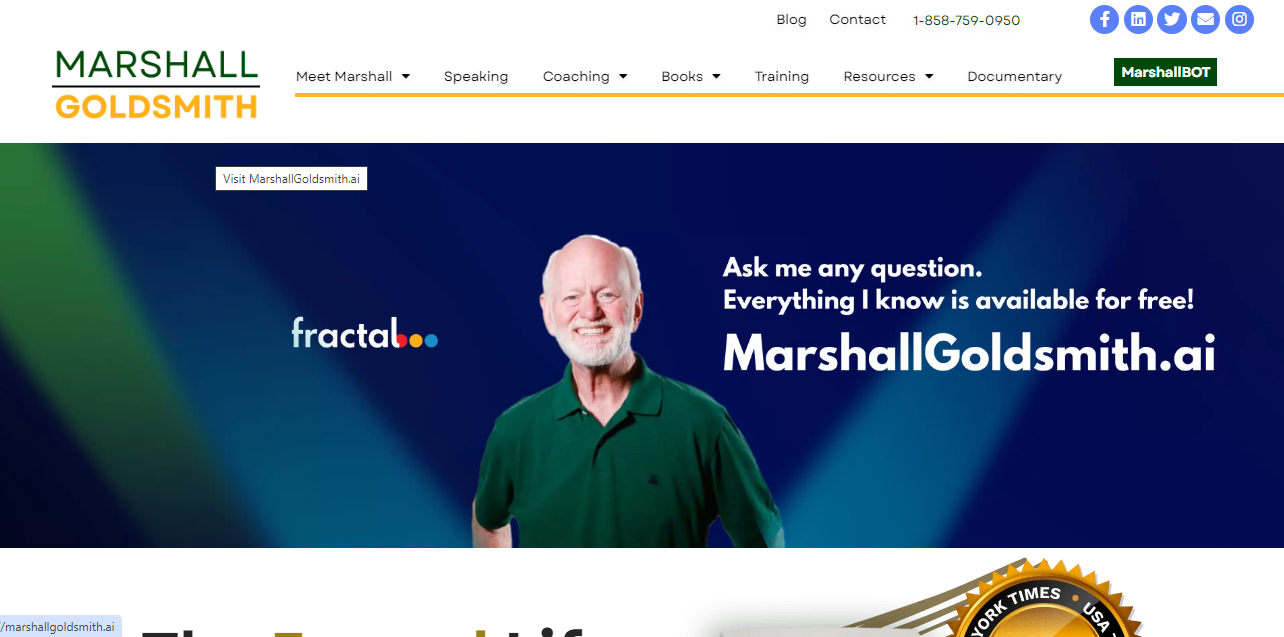
One of the top 10 business thinkers in the world and a leading executive coach, Marshall Goldsmith needs no introduction. His coaching expertise in leadership and behavioral change spans four decades. He is the only person in the world to have won the Thinkers50 Award twice. A multi-hyphenate, he has authored 41 books, including What got you here won’t get you there and The Earned Life.
Goldsmith is known for his unique performance-based coaching pricing model, in which the performance is assessed by the client’s key stakeholders(360-degree feedback). Leadership coaching and positive behavioral change are his key areas of expertise.
Resources: Blogs, videos, tools(apps, surveys, spreadsheets), images, podcasts, interviews, and translations.
-
Jamie Bronstein (Relationship Coaching)
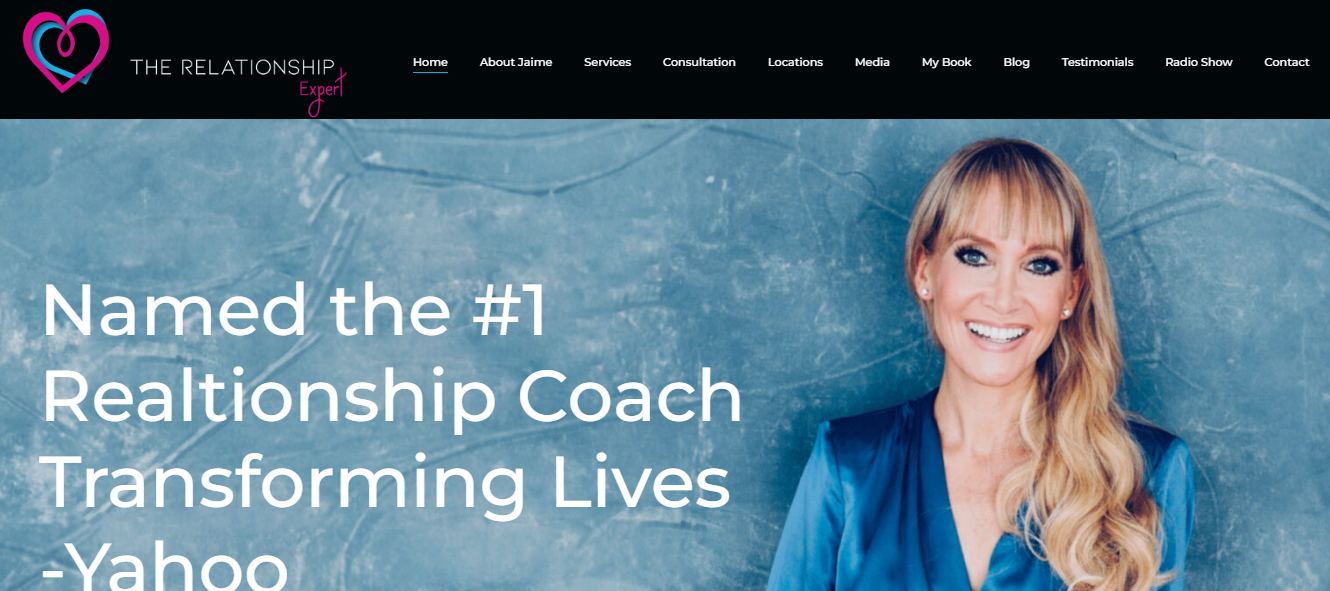
Another leading personality in the coaching domain — Jamie Broinstein, is a relationship therapist, coach, author, and speaker. She’s named as the #1 relationship expert transforming lives by YahooFinance. The host of the show “Love Talk Live” has an attractive portfolio of 20 years of guiding people through their relationship problems.
Bronstein advocates that people were born to have the right kind of love in their lives, not just any love. Her top services are for singles/ daters, couples/married, marriage Therapy counseling, and breakups/divorce.
Her coaching sessions include lessons on healing one’s past, loving oneself unconditionally, untapped inner strengths and intuitions, and more. Jamie Broinstein is also the author of Manifesting: A Step-by-step Guide to Attract What is Meant for You, which offers great relationship advice.
Resources: Blogs, radio shows, podcasts, articles for People, The Today Show, Cosmopolitan, Business Insider, etc.
-
Clarissa Moore (Finance Coaching)
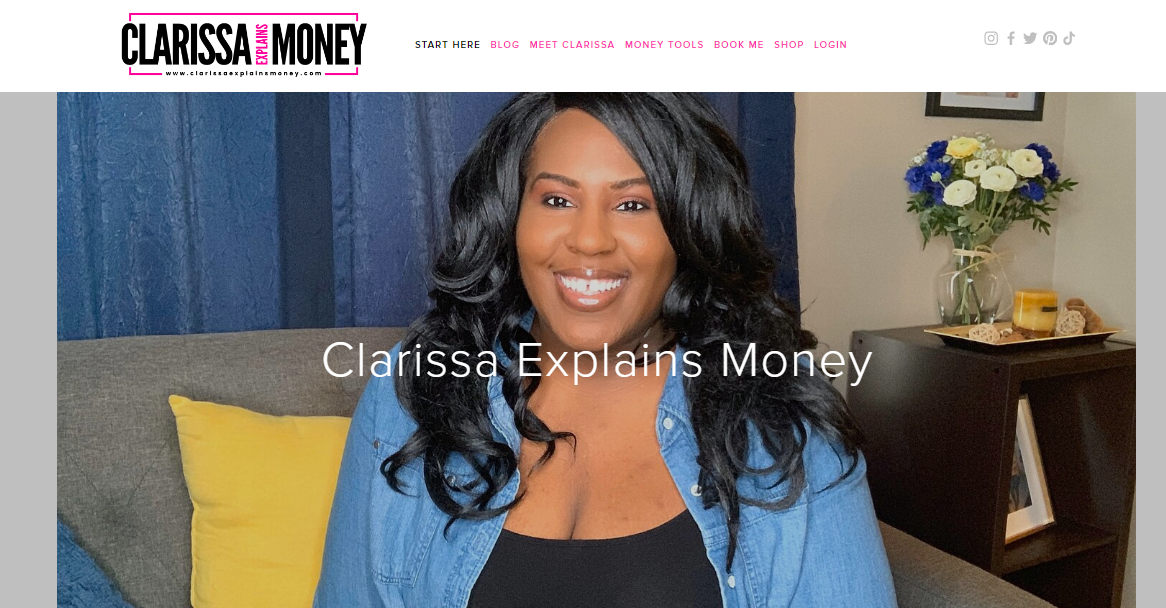
Clarissa Moore, known as the budget queen, is a popular finance coach who has helped 500 women save over $10,000. Her career in finance started as a bank employee in the credit card department.
After mastering finance essentials, she started her blog and coaching business in March 2019. Her services typically included educating single moms about finances and unlocking their financial freedom.
The finance wizard offers one-on-one private coaching, masterclasses, workshops, and speaking engagements to help clients reach their financial goals. Clarissa’s popular offerings include her workbook Pay Yourself First and Start a Six-a-Figure Dropshipping Company from Scratch course.
Resources: Blogs (Budgeting, saving, credit, career & income, taxes and real estate), Online Courses & eBooks, free financial plans, free guides to managing money, credit cheat codes
-
Ipsita Das (Life Coaching)
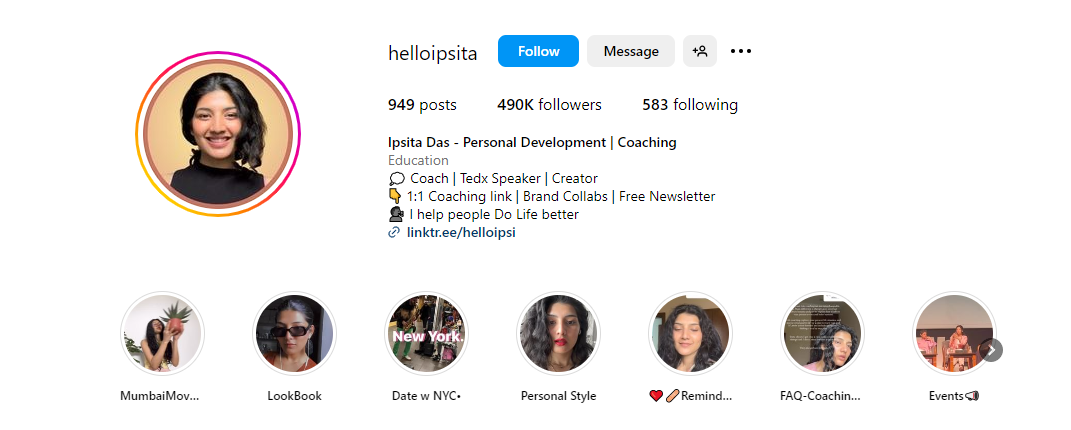
A certified life coach, TEDx speaker, and content creator, Ipsita Das dons multiple hats in her impressive coaching career. She offers 1:1 coaching sessions to help people unlock their potential and succeed in life. Moreover, the popular life coach has built her coaching empire through her solid social media presence on Instagram and YouTube.
She frequently posts on topics like self-doubt, overthinking, procrastination, confidence, etc. Ipsita Das even spoke on the TEDx platform on “Why we overthink, how we overcome it?” The life coach interacts with her online audience through frequent Q&A sessions and engagement workshops.
Resources: Blogs, Engaging Posts, YouTube Videos, Newsletters
-
Jeremy Ethier (Fitness Coaching)
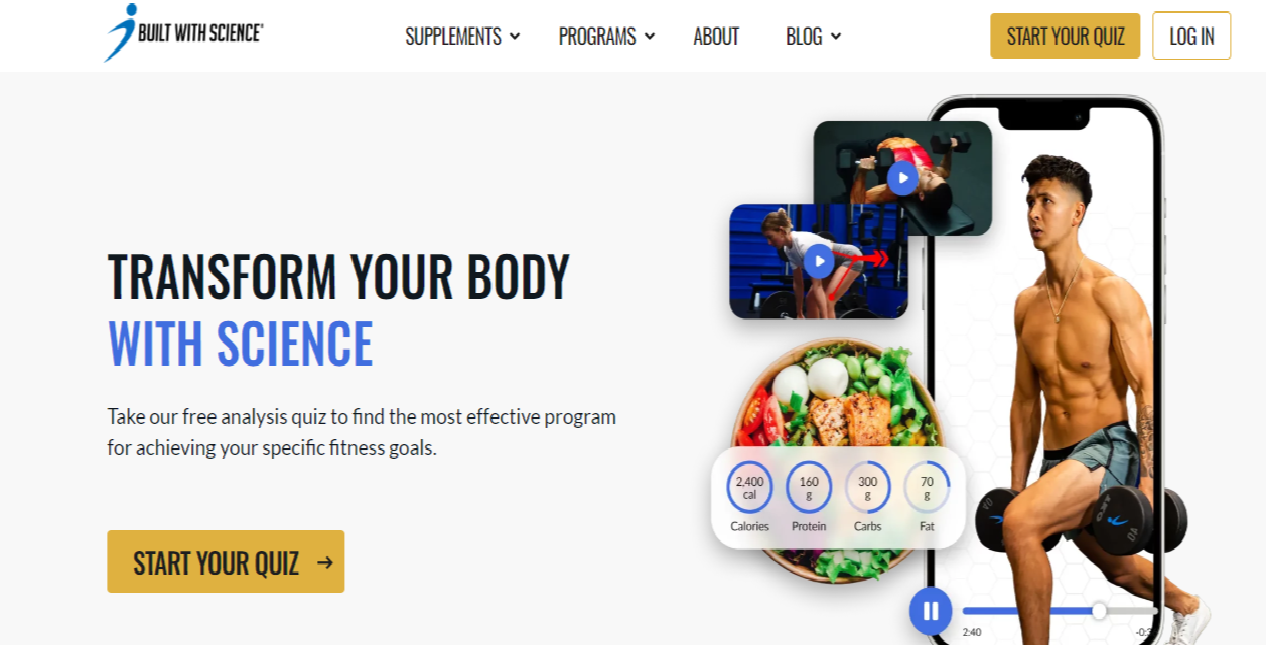
Jeremy Ethier is a well-known science and fitness expert and founder of Built With Science. He is synonymous for his science-backed approach to help people burn fat and build lean muscles. Ethier has an impressive 5 million subscriber base on YouTube and has served 100,000 clients through his fitness programs.
Ethier’s training techniques are the result of hours of research and trial and error. From beginner shred and lean programs to intermediate programs and custom workout plans, he caters to a broad audience. Additionally, his 2-on-1 coaching and 1-on-1 nutrition programs have helped numerous clients achieve results.
Resources: Blogs(diet, workout, fitness tips), YouTube Videos, workout supplements
Ready to Build Your Profitable Coaching Empire?
Starting an online coaching business is indeed a profitable endeavor. But you need to pull the right levers — a profitable niche, suitable business model, robust coaching platform, stellar branding, and promotional strategies. Most importantly, build a brand that aligns with your business and resonates with your clients!
While scaling your business takes time, an excellent software can help you clear the roadblocks and streamline it! So, start building your online coaching business with Pinlearn, your all-in-one solution to create a thriving coaching community!
FAQs Related to How to Start an Online Coaching Business
1. Is it profitable to start an online coaching business?
Considering the low startup cost, high revenue, and global reach, the online coaching business is indeed lucrative.
2. How do you price your online coaching services?
Set an hourly rate for your coaching services while starting, then explore other pricing models as you gain a decent audience. Consider factors like market trends and competitors, your time and efforts, niche and target audience to decide your prices.
3. How do you attract online coaching clients?
Use a combination of organic and paid marketing to promote your coaching business. Leverage social media marketing, guest blogging, email marketing, influencer marketing, and paid ads to grow your clients.


